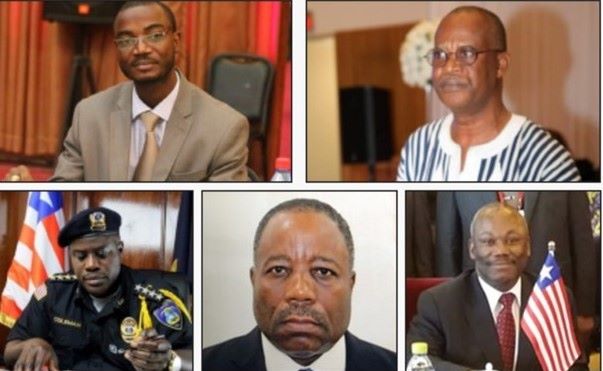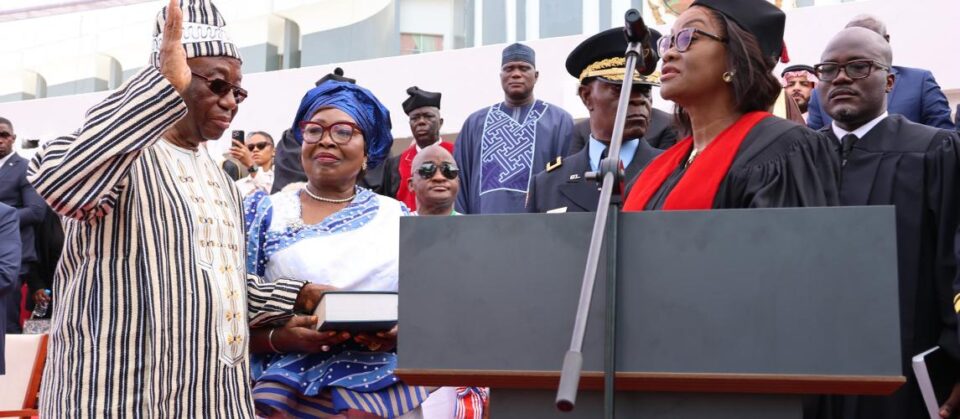Reflection Part 9: By Hun-bu Tulay
PHOTO: Liberia’s 26th President Joseph Nyuma Boakai taking the oath of office on January 22, 2024
Cell #: 231-886-517-356/777-111-032/Email: ntevoma@gmail.com
In every society/nation, there are two groups of people that are dangerous:
- Those who truly understand and know that something profound may be wrong or problematic but then are hesitant to speak/do not speak about it.
- Those who speak confidently about an issue but do not truly grasp the essence of the issues.
These two groups of people have destroyed societies and nations. We in Liberia must change course; let those who know speak out and those who do not know keep quiet. Society cannot get better if we who know continue to be silent. We have written many features and we will continue to do so because we believe the country has great potentials, but the potentials must be tapped.
It seems that those around the presidency often do not tell him or her the truth or may not even know the truth, but they speak confidently to the presidency. Such people are dangerous to the growth and development of the country. Liberia has suffered a lot and will continue to suffer a lot not because of the VIOLENCE of BAD PEOPLE. But the silence of GOOD and KNOWLEDGEABLE PEOPLE. It is time to change this. We will start with the most elemental issue “The President’s Appointing Power.”
The President’s Appointing Power: The appointing power of the president of Liberia is limited and not everyone appointed by the president shall hold their offices at the pleasure of the president. The constitution made it clear in Article 56(a), and it reads “All cabinet ministers, deputy and assistant
ministers, ambassadors, ministers and consuls, superintendents of counties and others government officials, both military and civilian, appointed by the president pursuant to this constitution shall hold their offices at the pleasure of the president.” Those around the presidency often believe that this appointing and dismissing power of the president extends to even Autonomous Public Commissions and Agencies. Unfortunately, this is not the case. Article 89 states:
“The following Autonomous Commissions are hereby established:
- Civil Service Commission;
- Election Commission; and
- General Auditing Commission.
The Legislature shall enact laws for the governance of these Commissions and create other agencies as may be necessary for the effective operation of the government.”
As you have read, the Legislature enacts laws for the governance of the commissions and other autonomous agencies like Liberia Electricity Corporation (LEC), Liberia Tele commutation Authority (LTA), Liberia Renewable Energy Commission (LREC), Liberia Water and Sewer Corporation (LWSC), Liberia Revenue Authority (LRA), National Port Authority (NPA), Liberia Human Right Commission (LHRC), Environmental Protection Agency (EPA) and the list goes on. When the Legislature enacts the laws for these commissions and agencies, these laws clearly state methods of recruiting/ appointing the heads and deputy heads of these commissions and agencies. And we believe that the president must uphold the laws. We also like to inform the vetting committee appointed by the president that some of the acts have been amended and it is important that the committee and those around the president read the amended Acts of these Commissions and agencies before recommending names for appointments to the president. It would be unfortunate if the committee fails to do the due diligence; such neglect will greatly humiliate the president and no leader wants to be put in such a situation. We would like to zero in on one of the agencies as an example.
The Environmental Protection Agency: We can speak/ write on this agency with confidence because we were opportune to serve on THE NATIONAL ENVIRONMENTAL POLICY COUNCIL. (See section 7 of the EPA ACT). ANNEX 1, SECTION 7 gives the members of the Council. Part lll-ORGANIZATION AND ADMINISTRATION OF THE AGENCY, section 16 has to do with the appointment of the Executive Director. Before we continue, it is important to note that we served on the technical subcommittee that vetted three Executive Directors of the Environmental Protection Agency of Liberia namely, Ben Turtur Donnie, Dr. Alfred Armah and Madam Anyaa Vohiri. We served as a member for the vetting of Ben Turtur Donnie and we chaired the Technical subcommittee for the vetting of the other two Executive Directors (Dr. Armah and Madam Vohiri). The provision on the appointment of the Executive Director reads as follows:
- There shall be an Executive Director, who is a person with wide environmental knowledge and recognized commitment to sustainable management of the environment, appointed by the president from a list of three names recommended by the Council (meaning the National Environmental Policy Council), except that the president may appoint an Interim Executive Director pending the formation of the Council.
- The Executive Director shall serve for a period of 7 years and shall be eligible for reappointment, except that there shall be appointed an Interim Executive Director.
- The Executive Director shall have security of tenure but shall cease to hold office if he/she
- Resign
- Is found guilty of gross misconduct on the advice of the Board and approval of the National Policy Council
- Is unable to discharge the functions of his office for health reasons.
Now let’s come back to count 1 of the requirements. It states that a person with wide environmental knowledge. What does “wide environmental knowledge” mean? This refers to the understanding and awareness of environmental issues and concepts. It includes knowledge about the environment and its components, and the interactions between these components.
Reference count 3b, the Executive Director does not hold the office at the pleasure of the president. The president does not get up one morning and dismisses the Executive Director. If charged for gross misconduct, he or she should be given “due process” and if found guilty, the Board advises the National Policy Council. If the Council approves the recommendation from the Board, the Council then recommends the removal of the Executive director to the president. Anything short of the procedure outlined, the Executive Director can challenge his or her removal.
Now over the past few weeks, a very good friend of mine appeared on the Spoon Talk Show and other radio stations claiming that he has a seven-year tenure at the EPA. He spoke with confidence. Unfortunately, he falls within the second category of people who are dangerous in society. He does not understand what he says and because he is respected and educated, those who do not know believe him. One of the panelists came very close to disagreeing with him but he sweet-talked the panelist.
The former Executive Director (Nathaniel Blama) did not challenge his removal because he knew that he was not being preferred/recommended by the National Policy Council, hence, he was an Interim Executive Director.

Some of the nominated officials in Boakai’s new government
Coming back to count 2, if the tenure of the Executive Director expires, he or she may be reappointed except that there shall be appointed an Interim Executive Director pending recommendation to the
president of a list containing three names from which the president shall appoint a permanent Executive Director, who shall serve for seven years. Any appointment without the recommendation from the National Policy Council is an Interim appointment. Hence the current Executive Director is an Interim Executive Director. President Joseph Nyumah Boakai, Sr. has the authority to appoint an Interim Executive Director pending reconstitution of the National Policy Council, which president Weah refused to reconstitute. This appointment is urgent because of the tension at the EPA currently. The current Executive Director does not understand Part lll-ORGANIZATION AND ADMINISTRATION OF THE AGENCY, section 16. And those who understand it have challenged his continued existence as Executive Director. We call on the vetting committee to act far on the EPA.
We would like to call the attention of the men around the president and the president himself that some of the Autonomous Agencies have similar laws. For some of them, it is the Board of Directors that vets the heads of the agencies and their deputies, after which a list of three for each position is submitted to the president for appointment. What this means, the president should first appoint the members of the Board of Directors of these agencies. We will be watching and analyzing the methods used to appoint the heads and deputies at these agencies. We would advise that the president have his Legal Team to research on some of these Autonomous Agencies before making appointments.
Great presidents are presidents who uphold the constitution and the laws of their countries. When President Boakai was inaugurated, he took a solemn OATH or affirmation “to preserve, protect and defend the constitution and the laws of the Republic and faithfully execute the duties of the office.” The men and women around the president need to guide him so that he does violate the OATH he took. Not because his predecessors violated the constitution and laws of the Republic therefore, he should. Maybe that is one reason, they will not be counted among the great presidents of the country. Help President Boakai take Liberia to its PAX ROMANA.

